|
|
|
Sort Order |
|
|
|
Items / Page
|
|
|
|
|
|
|
| Srl | Item |
| 1 |
ID:
153268
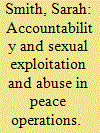

|
|
|
|
|
| Summary/Abstract |
In March 2016, the United Nations Security Council adopted its first resolution devoted entirely to the prevention of peacekeeper sexual exploitation and abuse (SEA) in peace operations. This article examines resolution 2272 by drawing on past practice and the perspective of those at mission sites—namely, Timor-Leste—arguing that the mechanism it establishes—repatriation—is limited in its capacity to prevent SEA and provide justice outcomes. The article demonstrates the pervasive sense of powerlessness regarding SEA and the impunity of those who do perpetrate SEA. The article further situates the issue of SEA by peacekeepers in the post-conflict (gendered) context in which it occurs, arguing that the resolution does not challenge the underlying norms and gendered relations of power that underpin peace operations. Instead, the resolution frames SEA as chiefly an issue of embarrassment for the United Nations and makes scant mention of the populations that peace operations are mandated to protect, as well as the perspectives and needs of victims of SEA.
|
|
|
|
|
|
|
|
|
|
|
|
|
|
|
|
| 2 |
ID:
143326
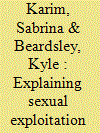

|
|
|
|
|
| Summary/Abstract |
Sexual exploitation and abuse (SEA) is an endemic problem in UN peacekeeping missions. It is not only a gross human rights violation, but also threatens to challenge the legitimacy of the peacekeeping mission and undermines the promotion of gender equality in host countries. We examine if the composition of peacekeeping forces along two dimensions – the proportion of women and the records of gender (in)equality in the contributing countries – helps explain variation in SEA allegations. Analysis of mission-level information from 2009 to 2013 indicates that including higher proportions of both female peacekeepers and personnel from countries with better records of gender equality is associated with lower levels of SEA allegations reported against military contingents. We conclude that substantial reductions in SEA perpetrated by peacekeepers requires cultivation of a value for gender equality among all peacekeepers – improving the representation of women may help but still stops short of addressing the root of the problem.
|
|
|
|
|
|
|
|
|
|
|
|
|
|
|
|
| 3 |
ID:
179551
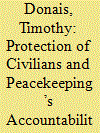

|
|
|
|
|
| Summary/Abstract |
Debates around performance and accountability are now front and centre in discussions around peacekeeping reform. Both concepts are prominent in the UN Secretary-General’s Action for Peacekeeping Initiative, while the Security Council recently stressed the need to improve ‘posture, behaviour, leadership, initiative and accountability’ within peace operations. This paper explores the politics of the accountability debate and the prospects for improved peacekeeper accountability in the context of protection of civilians (PoC) mandates, with an understanding that civilians in conflict often need protection not only from conflict parties but also – as the struggles with sexual exploitation and abuse (SEA) demonstrate – from peacekeepers themselves. While strengthened accountability mechanisms can help bridge the gap between the promise and the practice of protection, declining peacekeeping budgets and the amorphous and all-encompassing nature of PoC mandates complicate developing specific performance metrics and accountability mechanisms. Thus, while the UN has struggled to ensure misconduct accountability with regard to SEA, performance accountability represents a challenge of considerably greater magnitude. Absent serious consideration of the structural impediments involved, and the imperative of managing ambiguity, the accountability/performance debate may do little more than exacerbate tensions between those countries who staff peacekeeping missions and those who pay for them.
|
|
|
|
|
|
|
|
|
|
|
|
|
|
|
|
| 4 |
ID:
153847
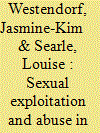

|
|
|
|
|
| Summary/Abstract |
In 2013, a UN investigation declared sexual exploitation and abuse (SEA) ‘the most significant risk to UN peacekeeping missions’. The exploitation and abuse of women and children by peacekeepers, aid workers, private contractors and other interveners has become ubiquitous to peace operations, ranging from rape to transactional sex, sex trafficking, prostitution and pornography. This article investigates the causes of SEA by interveners, and the development of policy responses undertaken by the UN and the international humanitarian community to prevent and ensure accountability for SEA. We argue that use of the umbrella term ‘SEA’, while helpful in distinguishing such behaviour from other forms of abuse, obscures the significant differences in the form, function and causes of the behaviours that fall under it, and we develop an account of the dominant forms SEA takes, based on survivor testimony, in order to better understand why policy responses have been ineffective. Our analysis of global policies around SEA demonstrates that it is dealt with as a discrete form of misbehaviour that occurs on an individual level and can be addressed through largely information-based training processes that inform personnel of its prohibition but fail to engage them in discussions of the local, international, normative, systemic and structural factors that give rise to it. We identify the structural and bureaucratic pressures that have contributed to the narrowing of approach regarding SEA to focus on individual compliance rather than the more complex set of factors at play, and which have undermined the effectiveness of policies globally.
|
|
|
|
|
|
|
|
|
|
|
|
|
|
|
|
| 5 |
ID:
172161
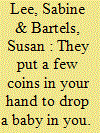

|
|
|
|
|
| Summary/Abstract |
Many peace support operations have faced allegations of sexual exploitation and abuse perpetrated by UN personnel against members of local communities. Some of these intimate relations result in children being born but there is little empirical data on the experiences of women and girls who conceive and bear these children. We analyse 265 self interpreted narratives from community members in Haiti about children fathered by UN personnel and born to local women or girls. The mixed methods results highlight three important themes: (a) poverty is a key underlying factor contributing to sexual exploitation and abuse by peacekeeping personnel, (b) the repatriation of implicated peacekeepers often leaves the woman and child in exacerbated poverty, and (c) intimate relations with fair-skinned peacekeepers and having fair-skinned children are sometimes perceived as desirable. The data highlight that children fathered by MINUSTAH personnel are typically being raised in settings of extreme economic deprivation and are often denied access to education and other basic services that would enable them to break the cycle of poverty. While the overarching need identified in this analysis is financial, additional research with the children themselves in warranted to identify other needs and to inform policies and programmes intended to improve their well-being.
|
|
|
|
|
|
|
|
|
|
|
|
|
|
|
|
|
|
|
|
|